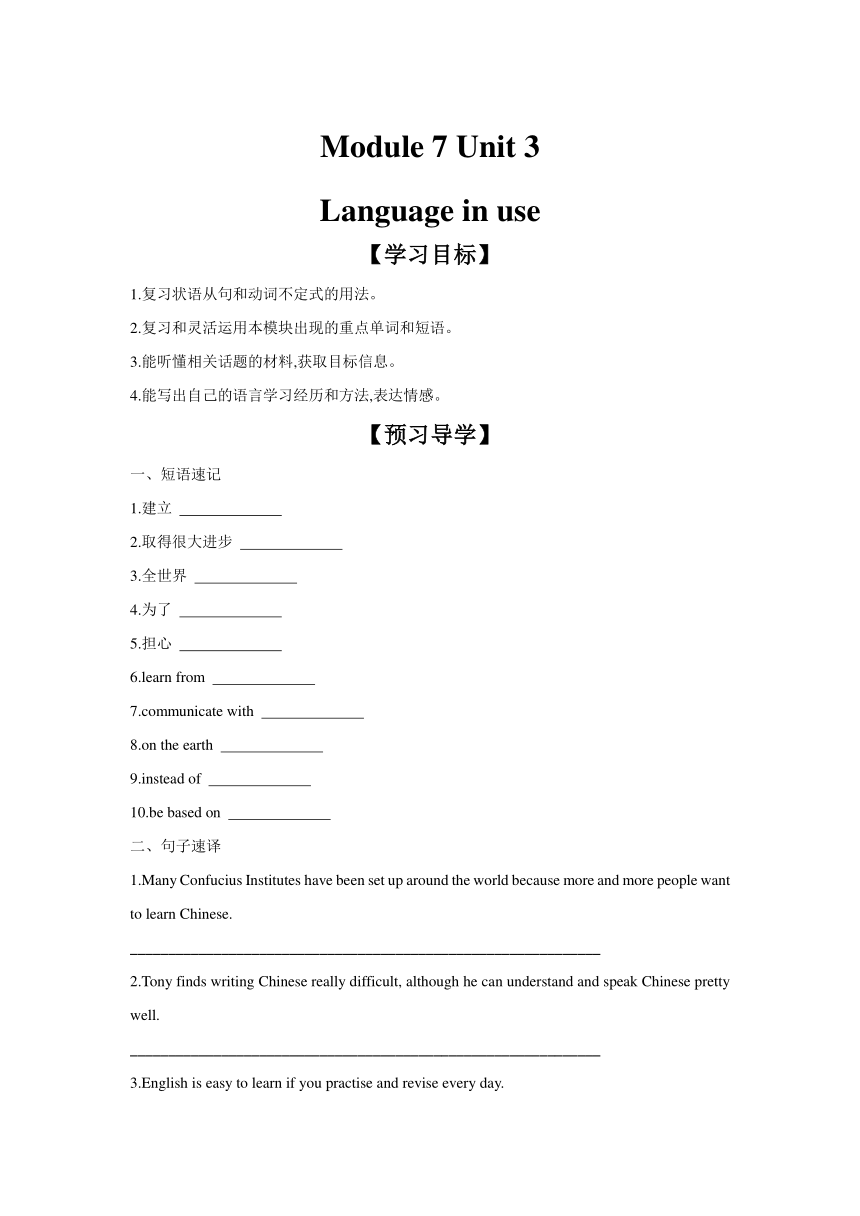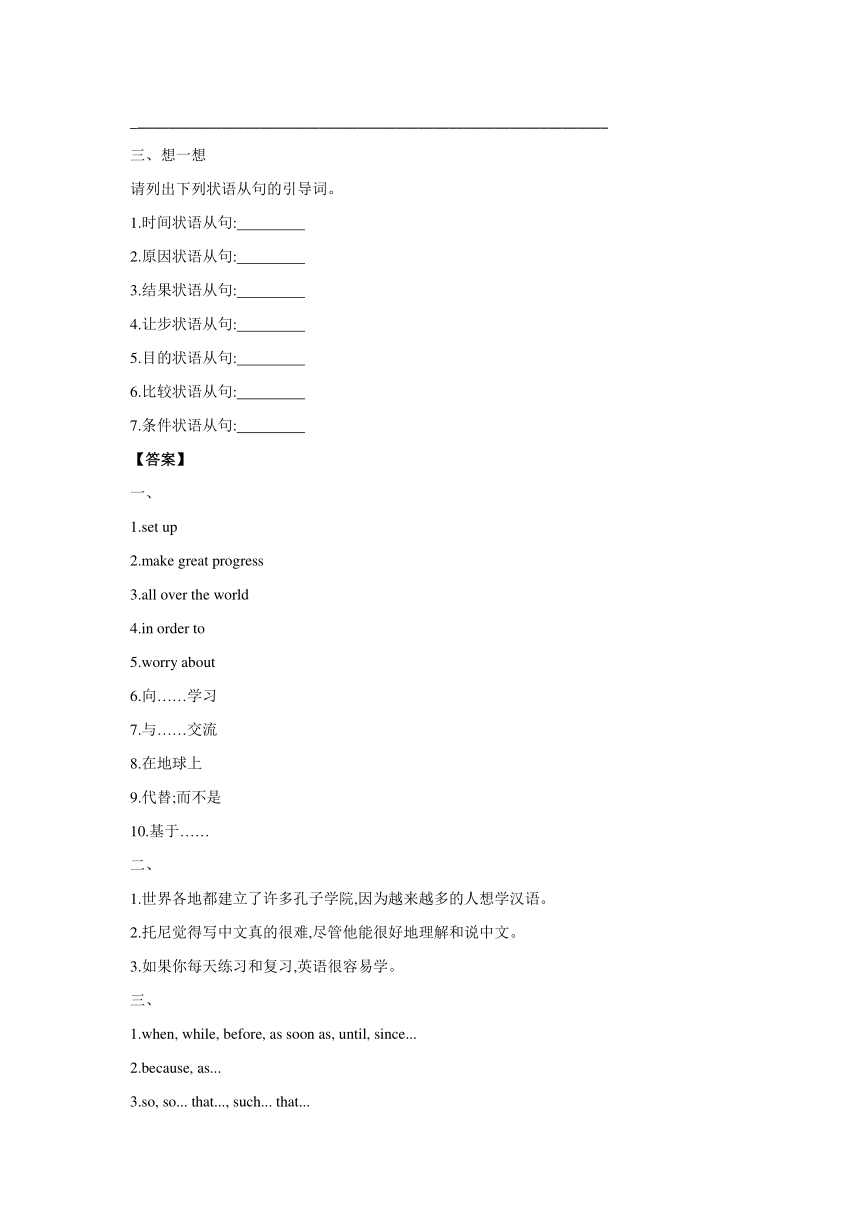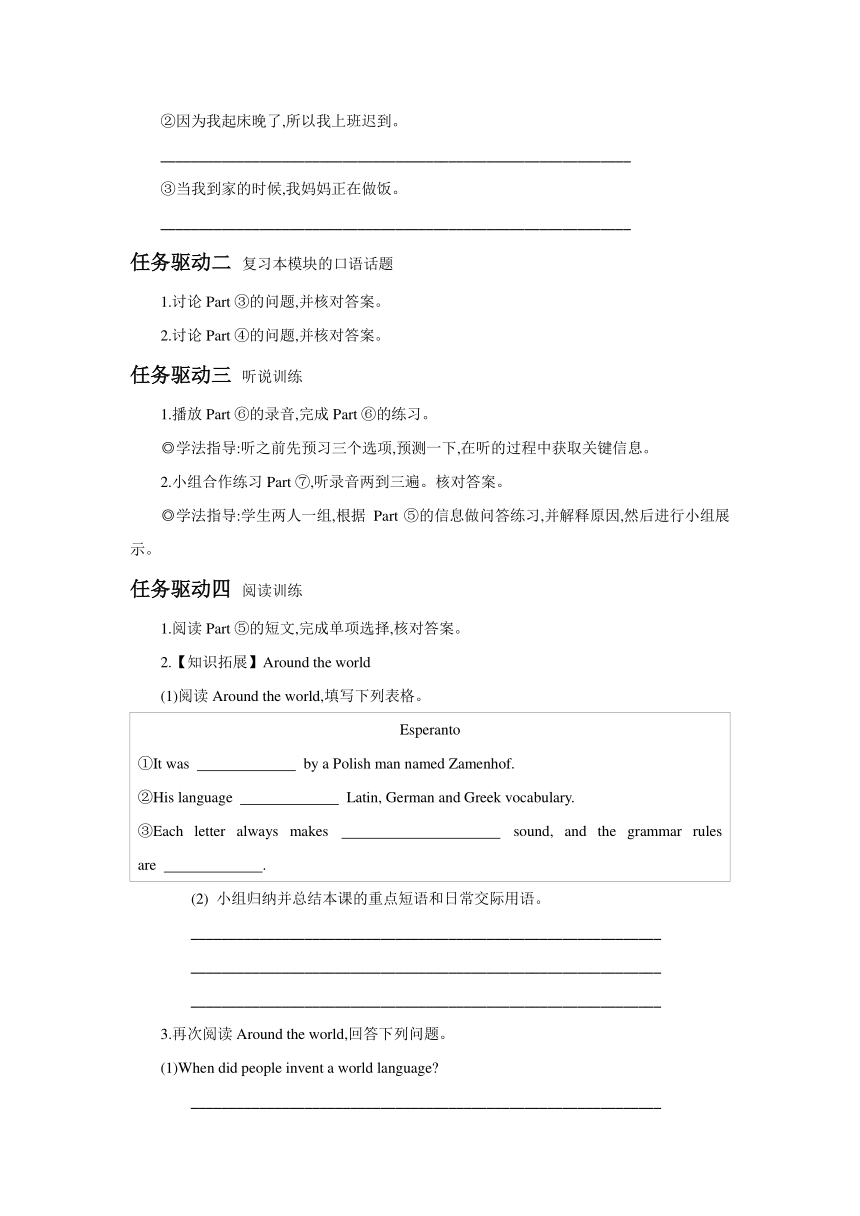Module 7 Unit 3 Language in use 学案(含答案)外研版九年级下册
文档属性
| 名称 | Module 7 Unit 3 Language in use 学案(含答案)外研版九年级下册 |

|
|
| 格式 | docx | ||
| 文件大小 | 22.6KB | ||
| 资源类型 | 教案 | ||
| 版本资源 | 外研版 | ||
| 科目 | 英语 | ||
| 更新时间 | 2024-02-26 00:00:00 | ||
图片预览




文档简介
Module 7 Unit 3
Language in use
【学习目标】
1.复习状语从句和动词不定式的用法。
2.复习和灵活运用本模块出现的重点单词和短语。
3.能听懂相关话题的材料,获取目标信息。
4.能写出自己的语言学习经历和方法,表达情感。
【预习导学】
一、短语速记
1.建立
2.取得很大进步
3.全世界
4.为了
5.担心
6.learn from
7.communicate with
8.on the earth
9.instead of
10.be based on
二、句子速译
1.Many Confucius Institutes have been set up around the world because more and more people want to learn Chinese.
______________________________________________________________
2.Tony finds writing Chinese really difficult, although he can understand and speak Chinese pretty well.
______________________________________________________________
3.English is easy to learn if you practise and revise every day.
______________________________________________________________
三、想一想
请列出下列状语从句的引导词。
1.时间状语从句:
2.原因状语从句:
3.结果状语从句:
4.让步状语从句:
5.目的状语从句:
6.比较状语从句:
7.条件状语从句:
【答案】
一、
1.set up
2.make great progress
3.all over the world
4.in order to
5.worry about
6.向……学习
7.与……交流
8.在地球上
9.代替;而不是
10.基于……
二、
1.世界各地都建立了许多孔子学院,因为越来越多的人想学汉语。
2.托尼觉得写中文真的很难,尽管他能很好地理解和说中文。
3.如果你每天练习和复习,英语很容易学。
三、
1.when, while, before, as soon as, until, since...
2.because, as...
3.so, so... that..., such... that...
4.although, though, even though, even if, but...
5.so that, in order that...
6.than, as...
7.if, unless, in case, as long as...
【合作探究】
任务驱动一 复习状语从句和动词不定式
1.复习状语从句和相关引导词。
2.小组内核对Part ①和Part ②的答案,核对答案时说说是哪种状语从句和动词不定式、在句中作什么成分。复习下列与动词不定式有关的句子:
(1)It’s important (for us) to protect our environment.(对我们来说)保护环境很重要。
(2)My job is to teach English. 我的工作是教英语。
(3)I have a lot of homework to do. 我有许多家庭作业要做。
(4)The cat is easy to take care of. 照顾这只猫很容易。
(5)Mrs Wang went to Shanghai to see her daughter. 王太太去上海看她女儿。
(6)We’re glad to meet you here. 我们很高兴在这儿见到你。
(7)He is too tired to work on. 他太累了以至于不能继续工作。
(8)The teacher is telling the students what to do. 老师正在告诉学生们做什么。
(9)He didn’t know where to go (=where he should go). 他不知道去哪里。
(10)I prefer to read a book rather than watch TV. 我宁愿看书也不愿看电视。
(11)They are made to work 12 hours every day. 他们被迫每天工作12个小时。
3.用所给词的适当形式填空。
①I managed (finish) the project that our teacher told us yesterday.
② (make) yourself more confident and knowledgeable, you need to read more.
③My two cousins decide (start) a new project together.
④It’s not easy (teach) my parents how to use a mobile phone.
⑤They asked us (tidy) up our classroom in twenty minutes.
4.翻译下列句子。
①如果你不好好学习,你就会在考试中失败。
______________________________________________________________
②因为我起床晚了,所以我上班迟到。
______________________________________________________________
③当我到家的时候,我妈妈正在做饭。
______________________________________________________________
任务驱动二 复习本模块的口语话题
1.讨论Part ③的问题,并核对答案。
2.讨论Part ④的问题,并核对答案。
任务驱动三 听说训练
1.播放Part ⑥的录音,完成Part ⑥的练习。
◎学法指导:听之前先预习三个选项,预测一下,在听的过程中获取关键信息。
2.小组合作练习Part ⑦,听录音两到三遍。核对答案。
◎学法指导:学生两人一组,根据Part ⑤的信息做问答练习,并解释原因,然后进行小组展示。
任务驱动四 阅读训练
1.阅读Part ⑤的短文,完成单项选择,核对答案。
2.【知识拓展】Around the world
(1)阅读Around the world,填写下列表格。
Esperanto ①It was by a Polish man named Zamenhof. ②His language Latin, German and Greek vocabulary. ③Each letter always makes sound, and the grammar rules are .
(2) 小组归纳并总结本课的重点短语和日常交际用语。
______________________________________________________________
______________________________________________________________
______________________________________________________________
3.再次阅读Around the world,回答下列问题。
(1)When did people invent a world language
______________________________________________________________
______________________________________________________________
______________________________________________________________
(2)Who invented the language
______________________________________________________________
(3)What is the language based on
______________________________________________________________
(4)How many people speak Esperanto
______________________________________________________________
(5)How many people learn it as a first language
______________________________________________________________
◎学法指导:学生根据提示词中的关键信息,如时间、地点等名词在原文中寻找答案。
4.模块任务
(1)小组讨论Part ⑧,谈论一下你在学习英语时遇到的困惑和难题。
(2)小组内谈论你在学习英语过程中碰到的难题,完成Part ⑨~Part ⑩。列出这些难题,并给同伴提出建议,最后把自己的难题和同伴给出的建议整理好写成小短文。互相交流一下。
______________________________________________________________
______________________________________________________________
______________________________________________________________
______________________________________________________________
______________________________________________________________
【答案】
任务驱动一:
3.①to finish ②To make ③to start ④to teach ⑤to tidy
4.①If you don’t study hard, you will fail in the exam.
②I was late for work because I got up late.
③When I got home, my mother was cooking.
任务驱动四:
2.(1)①invented
②is based on
③the same
④simple
(2)
since the twelfth century, have been inventing..., in the hope that..., be invented by sb., a Polish man named..., be based on, make the same sound, the grammar rules, be spoken by sb., two million people, have learned, as a first language, be unlikely to do sth., become a world language...
3.(1)Since the twelfth century.
(2)Zamenhof.
(3)Latin, German and Greek vocabulary.
(4)It is spoken by about two million people.
(5)A thousand people have learnt it as a first language.
4.
(2)
I am not good at English. My classmate Lucy tells me that the best way to improve English is to improve these skills—listening, speaking, reading, and writing.
I should practice them every day. I should remember more words and grammar. Reading more English story books or novels. Watching more English cartoons, TV shows or movies. Listening to English tapes and repeating after the speaker are also useful. Don’t be afraid to make any mistakes.
Ask the teachers when I don’t understand anything. Always remember: Practice makes perfect! I hope everyone makes progress. Thanks!
【知识超市】
[命题点一]It may be that, one day, instead of English, another language will be used across the world.也许有一天,世界各地将使用另一种语言而不是英语。
【例句呈现】
1.I will attend the meeting instead of Mr. Green. 我将代替格林先生参加会议。
2.We did many interesting things instead of sleeping at home. 我们做了很多有趣的事情,而不是在家里睡觉。
3.He didn’t do his homework on Sunday. Instead, he played all day. 星期天他没有做他的家庭作业,而是整天都在玩。
【用法小结】instead of代替;而不是
instead of 介宾短语, 意为“代替;而不是”,后面常跟名词或动名词。
instead 作副词,意为 “代替,替代”, 通常位于句尾,如位于句首时后面常用逗号隔开。
对点自测
完成下列句子,每空一词
1.The young should do meaningful things instead of (play) all day.
2.他们没有遇到她,而是遇到了她的表姐。
They didn’t meet her, they met her cousin .
3.他没有喝啤酒,而是喝了一些果汁。
He drank some juice beer.
【答案】
1.playing 2.instead 3.instead of
[命题点二]His language is based on Latin, German and Greek vocabulary.他的语言是以拉丁语、德语和希腊语词汇为基础。
【例句呈现】
1.Don’t base your happiness on someone else’s pain.不要把你的开心建立在别人的痛苦之上。
2.Our health is based on enough exercise and sleep. 我们的健康是以足够的锻炼和睡眠为基础的。
【用法小结】
be based on 意为“根据……”;“基于……”,用法应是A be based on B,主语是物。
base...on... 意为“以……为根据”, 用法应是 base A on B。
对点自测
根据中文完成句子,每空一词
1.爱迪生把他的想法建立在科学实验的基础上。
Edison his ideas scientific experiments.
2.他所说的话是以事实为根据的。
What he said facts.
【答案】
1.based; on
2.is based on
Language in use
【学习目标】
1.复习状语从句和动词不定式的用法。
2.复习和灵活运用本模块出现的重点单词和短语。
3.能听懂相关话题的材料,获取目标信息。
4.能写出自己的语言学习经历和方法,表达情感。
【预习导学】
一、短语速记
1.建立
2.取得很大进步
3.全世界
4.为了
5.担心
6.learn from
7.communicate with
8.on the earth
9.instead of
10.be based on
二、句子速译
1.Many Confucius Institutes have been set up around the world because more and more people want to learn Chinese.
______________________________________________________________
2.Tony finds writing Chinese really difficult, although he can understand and speak Chinese pretty well.
______________________________________________________________
3.English is easy to learn if you practise and revise every day.
______________________________________________________________
三、想一想
请列出下列状语从句的引导词。
1.时间状语从句:
2.原因状语从句:
3.结果状语从句:
4.让步状语从句:
5.目的状语从句:
6.比较状语从句:
7.条件状语从句:
【答案】
一、
1.set up
2.make great progress
3.all over the world
4.in order to
5.worry about
6.向……学习
7.与……交流
8.在地球上
9.代替;而不是
10.基于……
二、
1.世界各地都建立了许多孔子学院,因为越来越多的人想学汉语。
2.托尼觉得写中文真的很难,尽管他能很好地理解和说中文。
3.如果你每天练习和复习,英语很容易学。
三、
1.when, while, before, as soon as, until, since...
2.because, as...
3.so, so... that..., such... that...
4.although, though, even though, even if, but...
5.so that, in order that...
6.than, as...
7.if, unless, in case, as long as...
【合作探究】
任务驱动一 复习状语从句和动词不定式
1.复习状语从句和相关引导词。
2.小组内核对Part ①和Part ②的答案,核对答案时说说是哪种状语从句和动词不定式、在句中作什么成分。复习下列与动词不定式有关的句子:
(1)It’s important (for us) to protect our environment.(对我们来说)保护环境很重要。
(2)My job is to teach English. 我的工作是教英语。
(3)I have a lot of homework to do. 我有许多家庭作业要做。
(4)The cat is easy to take care of. 照顾这只猫很容易。
(5)Mrs Wang went to Shanghai to see her daughter. 王太太去上海看她女儿。
(6)We’re glad to meet you here. 我们很高兴在这儿见到你。
(7)He is too tired to work on. 他太累了以至于不能继续工作。
(8)The teacher is telling the students what to do. 老师正在告诉学生们做什么。
(9)He didn’t know where to go (=where he should go). 他不知道去哪里。
(10)I prefer to read a book rather than watch TV. 我宁愿看书也不愿看电视。
(11)They are made to work 12 hours every day. 他们被迫每天工作12个小时。
3.用所给词的适当形式填空。
①I managed (finish) the project that our teacher told us yesterday.
② (make) yourself more confident and knowledgeable, you need to read more.
③My two cousins decide (start) a new project together.
④It’s not easy (teach) my parents how to use a mobile phone.
⑤They asked us (tidy) up our classroom in twenty minutes.
4.翻译下列句子。
①如果你不好好学习,你就会在考试中失败。
______________________________________________________________
②因为我起床晚了,所以我上班迟到。
______________________________________________________________
③当我到家的时候,我妈妈正在做饭。
______________________________________________________________
任务驱动二 复习本模块的口语话题
1.讨论Part ③的问题,并核对答案。
2.讨论Part ④的问题,并核对答案。
任务驱动三 听说训练
1.播放Part ⑥的录音,完成Part ⑥的练习。
◎学法指导:听之前先预习三个选项,预测一下,在听的过程中获取关键信息。
2.小组合作练习Part ⑦,听录音两到三遍。核对答案。
◎学法指导:学生两人一组,根据Part ⑤的信息做问答练习,并解释原因,然后进行小组展示。
任务驱动四 阅读训练
1.阅读Part ⑤的短文,完成单项选择,核对答案。
2.【知识拓展】Around the world
(1)阅读Around the world,填写下列表格。
Esperanto ①It was by a Polish man named Zamenhof. ②His language Latin, German and Greek vocabulary. ③Each letter always makes sound, and the grammar rules are .
(2) 小组归纳并总结本课的重点短语和日常交际用语。
______________________________________________________________
______________________________________________________________
______________________________________________________________
3.再次阅读Around the world,回答下列问题。
(1)When did people invent a world language
______________________________________________________________
______________________________________________________________
______________________________________________________________
(2)Who invented the language
______________________________________________________________
(3)What is the language based on
______________________________________________________________
(4)How many people speak Esperanto
______________________________________________________________
(5)How many people learn it as a first language
______________________________________________________________
◎学法指导:学生根据提示词中的关键信息,如时间、地点等名词在原文中寻找答案。
4.模块任务
(1)小组讨论Part ⑧,谈论一下你在学习英语时遇到的困惑和难题。
(2)小组内谈论你在学习英语过程中碰到的难题,完成Part ⑨~Part ⑩。列出这些难题,并给同伴提出建议,最后把自己的难题和同伴给出的建议整理好写成小短文。互相交流一下。
______________________________________________________________
______________________________________________________________
______________________________________________________________
______________________________________________________________
______________________________________________________________
【答案】
任务驱动一:
3.①to finish ②To make ③to start ④to teach ⑤to tidy
4.①If you don’t study hard, you will fail in the exam.
②I was late for work because I got up late.
③When I got home, my mother was cooking.
任务驱动四:
2.(1)①invented
②is based on
③the same
④simple
(2)
since the twelfth century, have been inventing..., in the hope that..., be invented by sb., a Polish man named..., be based on, make the same sound, the grammar rules, be spoken by sb., two million people, have learned, as a first language, be unlikely to do sth., become a world language...
3.(1)Since the twelfth century.
(2)Zamenhof.
(3)Latin, German and Greek vocabulary.
(4)It is spoken by about two million people.
(5)A thousand people have learnt it as a first language.
4.
(2)
I am not good at English. My classmate Lucy tells me that the best way to improve English is to improve these skills—listening, speaking, reading, and writing.
I should practice them every day. I should remember more words and grammar. Reading more English story books or novels. Watching more English cartoons, TV shows or movies. Listening to English tapes and repeating after the speaker are also useful. Don’t be afraid to make any mistakes.
Ask the teachers when I don’t understand anything. Always remember: Practice makes perfect! I hope everyone makes progress. Thanks!
【知识超市】
[命题点一]It may be that, one day, instead of English, another language will be used across the world.也许有一天,世界各地将使用另一种语言而不是英语。
【例句呈现】
1.I will attend the meeting instead of Mr. Green. 我将代替格林先生参加会议。
2.We did many interesting things instead of sleeping at home. 我们做了很多有趣的事情,而不是在家里睡觉。
3.He didn’t do his homework on Sunday. Instead, he played all day. 星期天他没有做他的家庭作业,而是整天都在玩。
【用法小结】instead of代替;而不是
instead of 介宾短语, 意为“代替;而不是”,后面常跟名词或动名词。
instead 作副词,意为 “代替,替代”, 通常位于句尾,如位于句首时后面常用逗号隔开。
对点自测
完成下列句子,每空一词
1.The young should do meaningful things instead of (play) all day.
2.他们没有遇到她,而是遇到了她的表姐。
They didn’t meet her, they met her cousin .
3.他没有喝啤酒,而是喝了一些果汁。
He drank some juice beer.
【答案】
1.playing 2.instead 3.instead of
[命题点二]His language is based on Latin, German and Greek vocabulary.他的语言是以拉丁语、德语和希腊语词汇为基础。
【例句呈现】
1.Don’t base your happiness on someone else’s pain.不要把你的开心建立在别人的痛苦之上。
2.Our health is based on enough exercise and sleep. 我们的健康是以足够的锻炼和睡眠为基础的。
【用法小结】
be based on 意为“根据……”;“基于……”,用法应是A be based on B,主语是物。
base...on... 意为“以……为根据”, 用法应是 base A on B。
对点自测
根据中文完成句子,每空一词
1.爱迪生把他的想法建立在科学实验的基础上。
Edison his ideas scientific experiments.
2.他所说的话是以事实为根据的。
What he said facts.
【答案】
1.based; on
2.is based on
同课章节目录
- Module 1 Travel
- Unit 1 We toured the city by bus and by taxi
- Unit 2 It's a long story.
- Unit 3 Language in use
- Module 2 Education
- Unit 1 They don't sit in rows.
- Unit 2 What do I like best about school?
- Unit 3 Language in use
- Module 3 Life now and then
- Unit 1 They sometimes work harder.
- Unit 2 I think life is better today.
- Unit 3 Language in use.
- Module 4 Rules and suggestions
- Unit 1 You must be careful of falling stones.
- Unit 2 we must keep the camp clean.
- Unit 3 Language in use.
- Revison A
- Module 5 Look after yourself
- Unit 1 We'd better get you to hospital.
- Unit 2 Get off the sofa!
- Unit 3 Language in use.
- Module 6 Eating togethe
- Unit 1 When is the school-leavers' party?
- Unit 2 Knives and forks are used for most Western
- Unit 3 Language in use
- Module 7 English for you and me
- Unit 1 Have you ever been to an English corner?
- Unit 2 We all own English.
- Unit 3 Language in use
- Module 8 My future life
- Unit 1 Here's to our friendship and the future
- Unit 2 I know that you will be better at maths.
- Unit 3 Language in use
- Revison B
